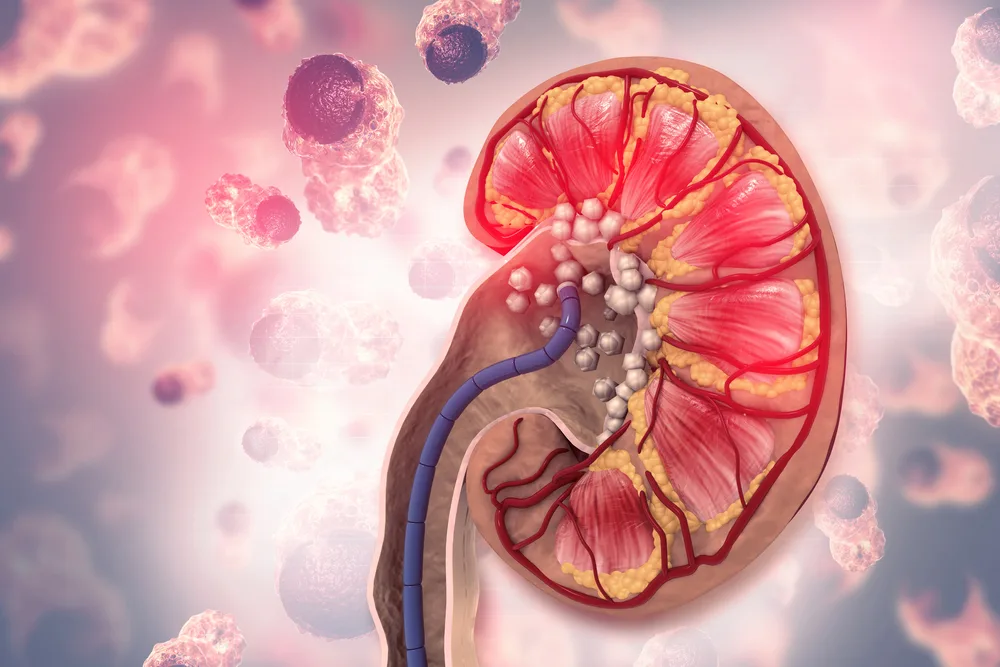Table of Contents
Auscultating heart sounds with a stethoscope is an essential part of medical checkups. If, during your examination, your doctor hears a “heart murmur sound,” it could be an early sign of serious heart disease.
What does a normal heartbeat sound like, and how to distinguish it from an abnormal heart sound? In this exploration, we will unveil the complexities surrounding heart murmurs, what causes heart murmurs, and when to worry about a heart murmur in adults.
Heart murmur sound
Murmurs are often unexpectedly found during auscultation, which means listening to sounds in your body, often with a stethoscope, a key part of examining the heart (1, 2).
Irregular heart sounds can also be detected with a manual or electronic stethoscope (3).
What does a normal heartbeat sound like?
Your heart consists of four chambers—two upper (atria) and two lower (ventricles). Heart valves are located between those chambers and close with each heartbeat, ensuring blood flows forward but not backward (1, 4).
Through a stethoscope, a normal heartbeat has two sounds, often described as ‘lub’ and ‘dub.’ The closing of heart valves causes the ‘lub-dub’ sound (1, 5).
The two heart sounds are also known as S1 (“lub”) and S2 (“dub”). S1 occurs during a heartbeat (systole) when two of the four valves close, the valves between the atria and the ventricles. S2 occurs during the heart’s resting phase (diastole) when the other two valves close, the valves between the ventricles and the arteries (1, 6).

What does a heart murmur sound like?
You can’t hear a heart murmur with your ear, but a healthcare provider can detect it using a stethoscope (1, 6, 7).
Heart murmurs are the swishing, whooshing, or rasping sounds during a heartbeat. Causes for heart murmur can be turbulent (choppy) blood flow or changes in the heart (1, 5, 8).
The sound of a murmur (pitch, volume, and rhythm) can vary depending on its cause. Words used to describe the pitch of a murmur include blowing, harsh, musical, rumbling, and squeaky (5).
The intensity of murmurs is graded from I to VI using the Levine grading scale. If a murmur is grade 4 or higher, it can produce thrills, which can be detected without a stethoscope (3, 4, 8):
- Grade I: Very faint, hard to hear
- Grade II: Soft
- Grade III: Easy to hear, but no vibration
- Grade IV: Easy to hear with vibration
- Grade V: Loud, can hear with stethoscope slightly off the chest
- Grade VI: Loudest, can hear without a stethoscope
Murmurs can also be described by the heartbeat phase when they occur (3, 4):
- Systolic murmurs: during the heart’s contraction and emptying
- Diastolic murmurs: during the heart’s relaxation and filling with blood
- Continuous: throughout the heartbeat
Extra heart sounds—Galloping rhythms
In a healthy adult, the heart typically produces two sounds, S1 and S2. However, doctors might hear additional heart sounds, S3 and S4, which occur during the heart’s resting phase. S3 occurs just after systole, while S4 occurs before diastole ends (1). These additional sounds can provide important diagnostic information and be signs of heart conditions (1).
Normal heartbeats, heard through a stethoscope, produce two distinct sounds, often described as ‘lub’ and ‘dub.’ These sounds coincide with the closing of specific heart valves. The sound of a murmur is swishing, rasping, or whooshing during a heartbeat. Some extra heart sounds (galloping) may indicate underlying heart conditions.






What causes heart murmurs?
The sound of a murmur can occur when (4, 7):
- A valve doesn’t close properly, causing blood to leak backward (regurgitation).
- A narrowed or stiff heart valve that slows down blood flow (stenosis).
In some cases, heart murmurs may indicate an underlying heart condition. Thus, it’s crucial to make a correct diagnosis (6).
Causes of innocent (benign) murmurs
Most heart murmurs are harmless, known as innocent (benign) murmurs. They don’t cause symptoms or issues and require no treatment (4, 6).
An innocent heart murmur often occurs in people with healthy hearts, especially in newborns, children (growth spurts during adolescence), and pregnant women (3, 5). Globally, about 10% of adults and 30% of children (aged 3 to 7) have this type of murmur (2, 7).
Faster heart pumps (increased blood flow) due to exercise, fever, or anxiety can cause a benign heart murmur (2, 6). Besides, anemia or an overactive thyroid can make blood thinner, causing innocent murmurs (5, 6, 8).
Causes of abnormal (pathologic) murmurs
Heart murmurs can be harmless, but it’s important to check them. They could arise from an underlying condition that disrupts the normal blood flow in the heart.
Murmurs may indicate some heart valve defects or structural issues (6). These include:
- Heart valve disease: A leaky or narrowed pulmonary, aortic, mitral, or tricuspid valve. Signs include ankle swelling, heart palpitations, shortness of breath, or chest pressure (8).
- Hypertrophic cardiomyopathy (heart muscle problems): A condition that makes your heart muscle thicker and stiffer. Other symptoms include fainting, chest pain, heart palpitations, fatigue, and shortness of breath (3, 8).
- Carcinoid heart disease: A rare cancerous tumor that releases chemicals and hormones that can affect your heart. The condition can lead to weight loss, belly pain, diarrhea, or low blood pressure (8).
- Cardiac myxoma: A rare, noncancerous tumor inside the heart that partly blocks blood flow. Symptoms involve heart blockages, blood clots, and general discomfort (2, 9).
Multiple murmurs can occur when there are several heart issues simultaneously (4). Heart valve issues in adults may develop later in life and be caused by (5, 8):
- Calcium deposits, which can cause calcific or degenerative valve disease
- Infection (endocarditis), which resides in the inner heart lining and valves
- Rheumatic fever, which is caused by untreated strep throat. Rheumatic fever is rare in the US (6).






What causes a murmur in children?
In a heart study involving 12,050 Black schoolchildren aged 2 to 18 years, 72% of the children were detected with innocent systolic murmurs (10). Innocent murmurs in children can stem from pulmonary flow murmurs, Still’s murmur, and venous hum (1, 4).
In children, pathologic murmurs may point to structural heart issues presenting from birth (congenital heart defects), such as (4, 7):
- Holes in the heart: Occur in the walls between the upper or lower chambers (5, 7). Examples include atrial septal defect (ASD) and ventricular septal defect (VSD).
- Patent ductus arteriosus (PDA): where a fetal blood vessel called ductus arteriosus (the opening between the aorta and pulmonary artery) doesn’t close after birth (2).
- Cardiac shunts: This happen when heart defects lead to abnormal blood flow between heart chambers or blood vessels (5).
- Tetralogy of Fallot: a condition with four heart defects (8, 11).
- Anomalous pulmonary venous return (an abnormal formation of the pulmonary veins).
- Marfan syndrome (13)
- Coarctation of the aorta
Less than 1% of pediatric heart murmurs are due to a heart defect (14). These conditions might require medicine, procedures, or surgery to fix (2, 15).
When to worry about a heart murmur in adults?
Innocent murmurs often go away as children grow up, but in some adults, they can persist throughout their lives without causing serious problems (4, 5).
Can a heart murmur get worse? A murmur doesn’t have complications, but complications can be related to the underlying condition causing the murmur (15).
Know your risk factors
Anemia, hyperthyroidism, anxiety, and fever can increase blood flow, causing innocent murmurs. Conditions that may raise the risk of pathologic murmurs are heart diseases and (3, 5, 6):
- Carcinoid syndrome
- Blood disorders with a high number of eosinophils (hypereosinophilic syndrome)
- Autoimmune disorders like lupus and rheumatoid arthritis
- High blood pressure in the lungs (pulmonary hypertension)
- History of rheumatic fever
- Intravenous drug use
Factors that increase the risk of heart murmurs in infants include family history of heart defects, the mother’s health conditions like diabetes and rubella (German measles, a viral infection), and using specific medications, alcohol, or illegal drugs during pregnancy (5).






Symptoms with abnormal heart murmur sounds
In adults, abnormal (pathologic) heart murmurs can cause symptoms like (5, 6, 8):
- Blue or gray fingernails or lips
- Chest pain or tightness
- Heart palpitations
- Persistent cough
- Shortness of breath
- Dizziness, fainting, or weakness
- Sweating
- Swollen liver or neck veins
- Weight gain
In infants and children, symptoms may include bluish skin, sweating, cough, chest pain, shortness of breath, or dizziness. Other signs of pathologic heart murmurs in children are (5, 6, 15):
- Poor appetite and growth
- Poor feeding but gaining weight
- Excessive fussiness
- Swelling (edema) of the lower legs, ankles, feet, abdomen, liver, or neck vein
When should you seek medical help?
Most heart murmurs are not a matter of concern, but it’s best to consult a specialist if you have risk factors or notice the mentioned symptoms, especially chest pain, shortness of breath, or dizziness (7).
However, a stethoscope can’t always distinguish between innocent and harmful murmurs. The doctor might inquire about your medical history or symptoms, ask you to change positions or hold your breath, and conduct additional medical tests if necessary (6).
Tests to diagnose heart murmurs might involve blood tests, maneuvers, cardiograms (echo, EKG, or ECG), and imaging. If the results aren’t clear, cardiac catheterization, using a tube inserted into a blood vessel, may be performed. If the murmurs are found to be innocent, there is no further action is needed (2, 3, 6).
Can a heart murmur go away?
In adults, innocent heart murmurs may disappear when the underlying condition, such as anemia or stress, is resolved. If a murmur is due to a heart problem, its duration varies depending on the type of disorder (2, 7). Murmurs resulting from valve issues or congenital heart problems may persist for life and worsen with time. Conditions like endocarditis can worsen rapidly in a few days, but other conditions progress more gradually over weeks or months (2).
In adults, pathologic murmurs can lead to symptoms such as chest pain, shortness of breath, and dizziness. Consult your doctor if you notice these symptoms or have a family history of heart disease. Innocent murmurs can disappear, but murmurs caused by heart problems may persist or worsen gradually.
Protect yourself from heart murmurs
There’s no known way to prevent heart murmurs, especially when the cause is congenital heart defects. However, adopting a healthy lifestyle can help prevent conditions linked to murmurs (2, 5).
Doctors can detect heart murmurs quite accurately through regular heart check-ups and stethoscopes, with a sensitivity of around 70% and a specificity of about 98%. Early detection of heart murmurs is vital for reducing the risk of illness and death (5, 8).
Avoiding intravenous drug use can reduce your risk of endocarditis. Take prescribed antibiotics precisely for strep throat to prevent rheumatic fever. If you already have had an episode of rheumatic fever, you might need antibiotics for up to 10 years to prevent a recurrence (2). How long can you live with a pathologic heart murmur? The outlook depends on the cause and severity. People with heart disease might need medication or surgery if the condition worsens (6).






Is a heart murmur an arrhythmia?
No, heart murmur and arrhythmia are separate heart conditions with distinct causes. A heart murmur involves unusual sounds during a heartbeat due to abnormal blood flow (6, 7), while arrhythmias refer to irregular heart rhythms or irregular heartbeat patterns (16). However, antiarrhythmic medications (to manage arrhythmia) can also be used to regulate the heart’s rhythm in cases of heart murmurs (6).
Is a heart gallop dangerous?
What causes the heartbeat sound?
The heart produces two main sounds, often described as ‘lub’ and ‘dub,’ caused by the closing of heart valves during a cardiac cycle. The S1 (lub) heart sound happens when the mitral and tricuspid valves close during systole. The S2 (dub) heart sound occurs when the aortic and pulmonic valves close during diastole (1, 6).
Can stress cause heart murmurs?
Yes, stress factors like anxiety can lead to increased blood flow and trigger heart murmurs. Yet they are innocent, and they can go away when the stress is resolved (2).
Do heart murmurs get worse with age?
Innocent heart murmurs in children and young adults (under 18) usually disappear as they age (2, 7). Pathologic heart murmurs, linked to heart issues, can remain stable or get worse. These murmurs progress more frequently in older adults with calcium buildup, weakened immunity, and hardened blood vessels and valves (6, 18).
Can you exercise with a heart murmur?
The answer depends on the type and severity of the murmur and your overall health. Innocent heart murmurs are harmless, so you can exercise safely (4, 7). But if you have an abnormal heart murmur, which could signal a heart condition, consult your doctor for advice on safe exercises, including low-to-moderate-impact activities.
Summary
Heart sounds can change as you age. A heart murmur sound in childhood might disappear as you become an adult. Conversely, adults can develop murmurs, which could indicate a heart issue.
What causes heart murmurs? Innocent murmurs can result from increased blood flow. Abnormal murmurs may indicate underlying heart issues.
When to worry about a heart murmur in adults? Heart palpitations, chest pain, fainting, and shortness of breath can be signs of heart murmurs. Innocent murmurs are harmless, but it’s important to consult a doctor to rule out any underlying health issues.

















Comments
0